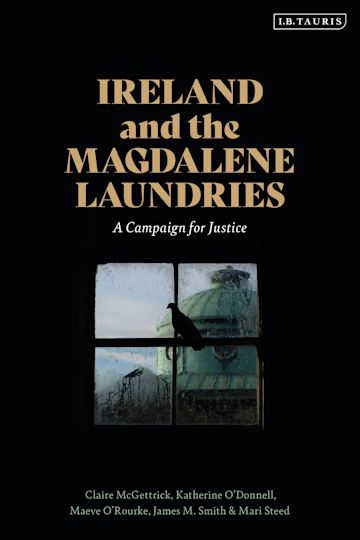Review: Ireland and the Magdalene Laundries – A Campaign for Justice

Christopher Stanley, litigation consultant at KRW LAW LLP in Belfast, offers a timely review of a new book documenting the campaign for victims and survivors of Magdalene laundries.
For almost 15 years I have practised law predominantly concerned with addressing the human rights deficit created by the British state through its failure to address the legacy of the conflict in Northern Ireland – a legal practice, to paraphrase US jurist Robert Cover, taking place “in a field of pain and death”.
In recent years my practice has expanded to encompass “historic” institutional (both residential and non-residential) systemic abuse across the island of Ireland, from the Kincora boys’ home in the north to the Tuam mother and baby home in the south. These abuses are not “historic” to women and children who endured them.
To an extent, this is a more insidious field of pain and death, as these abuses against women and children took place in institutions operated by primarily religious denominations in full view of society and with the full knowledge of the state – in fact, funded and “regulated” by state agencies from before partition until at least the mid-1990s.
The continuing exposure of the scale of these abuses and the continuing failings of the state (specifically, in the context of this book review, the Irish State) to suture the wounds of abuse by way of redress beyond empty apologies is appalling.
As I write, a headline in the Irish Independent screams out: “Minister reveals 24,000 Mother and Baby Homes survivors excluded from redress scheme”. Not only will those responsible by acts of either omission or commission not confront the scale of complicity and collusion, but they offer too little, too late.
Following the publication of the contentious and contested commission of investigation into mother and baby homes in January 2021, I receive up to three Google alerts each day on this issue.
Victims and survivors of the mother and baby homes, Magdalene laundries, industrial and factory schools have striven tirelessly to have their accounts heard and recorded. These are accounts of torture by way of symphysiotomy, inhuman and degrading treatment by way of physical and psychological punishment, slavery, forced adoption and enforced disappearance, unlawful participation in unethical clinical trials – a catalogue of systemic abuse amounting to crimes against humanity.
Ireland and the Magdalene Laundries: A Campaign for Justice is a significant, moving and powerful account of how those victims and survivors campaigned with civil society organisations to expose the scandal that turned the Republic of Ireland into to the “Republic of Shame”, as Caelainn Hogan called it.
The principal authors are four academics who worked tirelessly to bring to the public attention – and specifically the political class in Ireland – the extent and depth of this scandal both nationally and internationally. They worked together as Justice for Magdalenes Research (JFMR) (and also Adoption Rights Alliance (ARA) and the CLAAN project: Clann: Ireland’s Unmarried Mothers and their Children: Gathering the Data ‘Clann’).
The book is a model of social justice campaigning that uses academia, advocacy and activism to confront the powerful forces of state and church whose main concerns were to decommission the legal rights of victims and survivors. The campaign proceeded on the basis of “it’s about the women” and “do no harm”.
The book commences with a foreword written by Mari Steed, one of the 2,000 children exported from Ireland to the USA following her birth in Bessborough mother and baby home in Cork, where she endured being part of unethical vaccine trials.
Following their forced separation, Mari’s mother was sent into a Magdalene laundry. As Mari spent her first 18 months with her mother at Bessborough, she may qualify for a redress payment under the recently announced government ‘initiative’ – those who were forcibly separated after less than six months in a mother and baby home will not be eligible for payments under the scheme.
By gathering the evidence and presenting it to both national and international authorities, by lobbying and cajoling and developing strategies to force engagement, these campaign projects sought to enable forgotten and silenced voices to be heard, archives to be opened and a slow progression toward truth-seeking and establishing systems of accountability and mechanisms for reparation and redress.
It has taken over 20 years and still the Irish government – no matter of what hue – resists its full role and responsibility and still the orders that operated these institutions refuse to co-operate or enter into dialogue those who suffered in their ‘care’.
As the authors identify – and this is an important aspect of legal engagement within the territory (the field of pain and death) of institutional abuse – truth-telling is a collective social entitlement under both international human rights and humanitarian law and developing jurisprudence within the ‘living instrument’ that is the European Convention on Human Rights.
The right to truth – to know why – and to be able to speak truth to power as a protected victim or survivor becomes a norm for a modern democratic society founded on the rule of law. The right to truth therefore becomes a public obligation and a core aspect of redress and a mechanism to secure the non-repetition of abuse.
The authors conclude by developing this last point in the following terms: “Among the more positive lessons we learnt is that Irish civil society has a cohesive thirst for justice and will hold leaders to account if given an opportunity.”
And for the women who still await truth, justice and accountability? “We have learnt from listening to Magdalene survivors tell us how they survived repeated degradation: they found others to care for.” For which, Irish society must give recognition and gratitude.
Ireland and the Magdalene Laundries: A Campaign for Justice by Claire McGettrick, Katherine O’Donnell, Maeve O’Rourke, James M. Smith and Mari Steed. Published by Bloomsbury Publishing, 304 pp.










